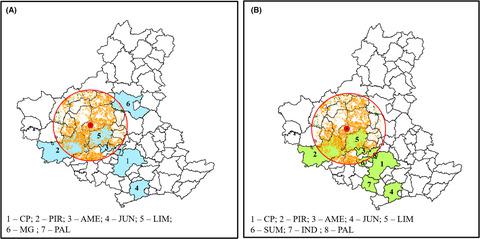当前位置:
X-MOL 学术
›
Energy Sci. Eng.
›
论文详情
Our official English website, www.x-mol.net, welcomes your
feedback! (Note: you will need to create a separate account there.)
Assessment of agricultural biomass residues to replace fossil fuel and hydroelectric power energy: A spatial approach.
Energy Science & Engineering ( IF 3.5 ) Pub Date : 2019-09-09 , DOI: 10.1002/ese3.462 Cristhy Willy da Silva Romero 1 , Mauro Donizeti Berni 2 , Gleyce Kelly Dantas Araujo Figueiredo 1 , Telma Teixeira Franco 2, 3 , Rubens Augusto Camargo Lamparelli 2
Energy Science & Engineering ( IF 3.5 ) Pub Date : 2019-09-09 , DOI: 10.1002/ese3.462 Cristhy Willy da Silva Romero 1 , Mauro Donizeti Berni 2 , Gleyce Kelly Dantas Araujo Figueiredo 1 , Telma Teixeira Franco 2, 3 , Rubens Augusto Camargo Lamparelli 2
Affiliation

|
Despite the recent discoveries of considerable fossil fuel reserves, Brazil is one of the only great economic and industrial powers with very high amounts of renewable energy in its electricity matrix. Approximately 79.3% of the electric energy supply comes from renewable resources, of which hydroelectric power represents 70.6%. The two primary concerns regarding hydroelectricity are the damage caused to the environment by the construction of dams and the uncertainty of the supply in cases of long drought seasons. This article presents an analysis on the availability and energy exploitation of sugarcane straw and forest residues derived from eucalyptus for decentralized generation using a Geographic Information System–based model. The potential bioelectricity and bioethanol production from sugarcane and eucalyptus biomass in the Administrative Region of Campinas (ARC) is higher than the demand in this region. The results provide guidelines for designing alternatives to the intended Nationally Determined Contributions in Brazil within the scope of the ARC, and they can be used to provide energy empowerment, electric matrix diversification, and new policies that address the residue availability and demand.
中文翻译:

评估农业生物质残留物替代化石燃料和水力发电能源:空间方法。
尽管最近发现了可观的化石燃料储量,但巴西是唯一在其电力矩阵中拥有大量可再生能源的经济和工业强国之一。大约79.3%的电能供应来自可再生资源,其中水力发电占70.6%。关于水力发电的两个主要问题是水坝建设对环境造成的破坏以及长期干旱季节供应的不确定性。本文使用基于地理信息系统的模型,对用于分散发电的甘蔗秸秆和桉树森林残留物的可用性和能源开发进行了分析。坎皮纳斯行政区(ARC)利用甘蔗和桉树生物质生产生物电和生物乙醇的潜力高于该地区的需求。研究结果为在 ARC 范围内设计巴西国家自主贡献的替代方案提供了指导,它们可用于提供能源赋权、电力矩阵多样化以及解决残留物可用性和需求的新政策。
更新日期:2019-09-09
中文翻译:

评估农业生物质残留物替代化石燃料和水力发电能源:空间方法。
尽管最近发现了可观的化石燃料储量,但巴西是唯一在其电力矩阵中拥有大量可再生能源的经济和工业强国之一。大约79.3%的电能供应来自可再生资源,其中水力发电占70.6%。关于水力发电的两个主要问题是水坝建设对环境造成的破坏以及长期干旱季节供应的不确定性。本文使用基于地理信息系统的模型,对用于分散发电的甘蔗秸秆和桉树森林残留物的可用性和能源开发进行了分析。坎皮纳斯行政区(ARC)利用甘蔗和桉树生物质生产生物电和生物乙醇的潜力高于该地区的需求。研究结果为在 ARC 范围内设计巴西国家自主贡献的替代方案提供了指导,它们可用于提供能源赋权、电力矩阵多样化以及解决残留物可用性和需求的新政策。











































 京公网安备 11010802027423号
京公网安备 11010802027423号